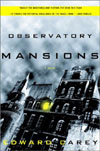
Comment
on this story
|
 |

Majors and Carey manipulate their voice to provide insight and depth
by Adrienne Martini
Inman Majors' Swimming in the Sky (SMU Press/$19.95) is such a rich book that it's near impossible to figure out how to dive into defining it. While it's fair to characterize it as a first novel, it is certainly one filled with a distinctive voice, rare energy, and delicate touch—all of which set it apart from most first novels. Swimming has the hallmarks of a classic coming-of-age story, but the main character already is "of age" and is not so much on the verge of defining who he is but, rather, what he should be. And it's sort of Southern, but not the South of Faulkner or McCarthy or Welty. No grits are eaten. No tobacco is grown. But it is still, somehow, of the South and its convoluted admiration of sprawling families and ramshackle fortunes.

If you forced the issue of definition, it would not be inaccurate to say that Swimming is a sort of Infinite Jest-lite—not as heavy in terms of sheer poundage and complexity but similar in theme. Both share a sports hero who takes a bad trip (and by this think recreational chemicals, not a vacation gone awry) and ends up floating in an eddy that grows in the middle of his life. But Majors, unlike David Foster Wallace, plunks us into the middle of his protagonist Jason Saylor's slack period and hones in on this character like a coonhound on a, well, 'coon.
Saylor—Say, to his friends—is fresh out of the rarefied air of Vanderbilt and back home in suburban Knoxville. Say, like Majors himself, comes from a football dynasty, and both character and author grew up in the shadows of great uncles who were worshipped by Vol fans. The Majors family (and, by extension, the Saylor clan), in 1960s Knoxville, were like the Kennedys in 1960s America—except not Catholic.
As much as Swimming is about modern day, 25-year-old Say and his lack of direction, it is equally about East Tennessee and this scruffy little town. Like Say, the city is also wallowing in the quagmire of not knowing what it wants to be nor what it wants, even now. Majors writes:
"The red-eyed philosophers, the goateed gurus, Knoxville's earth mothers and starry-eyed boys who couldn't quite make it to New York or San Francisco, who couldn't quite make it in Atlanta, the scarred and wounded, the jive asses and profound, all looking for they knew not what in Knoxville, this island of Misfit Toys."
Even if you don't want to read Majors' descriptions of Knoxville, which are both bitter and fond, the richness of Majors' characters (even Say's step-father's pet poodle has a distinct personality) and the strength of his prose move this story—even when the protagonist seems to be simply spinning his wheels. At first, admittedly, his clean, somewhat snarky voice seems distant, as if the reader is going to be forced to view the whole story from behind a slab of glass. As you move through these four months in Say's summer, you realize that Majors is more clever than you first thought, that the remove is intentional and the story couldn't be told any other way. Perhaps it's best to simply call Swimming smart and cleanly-written, rather than force it into some arbitrary category that, like its characters, it doesn't quite fit in to.
British writer Edward Carey's first novel Observatory Mansions (Crown/$23) is equally difficult to define for most of the same reasons. Carey's voice is distinct and, like Majors, sets up distance between the reader and characters with his writing style, which also mirrors the internal state of the main character. Francis Orme, Carey's protagonist, is difficult to like, but still remarkably compelling in spite of his obsessive, priggish behavior.

Orme holds the world at a distance, both physically—he always wears white gloves—and emotionally. He and a few other eccentricly damaged people live in a tumble-down mansion now completely isolated on the top of a traffic island. One day, in moves Anna Tap, a museum curator of sorts, who throws off the delicate stasis all of the residents have achieved and causes explosions within this self-isolated microcosm.
Mansions, at first, reads like a catalogue, ordered like the inside of Orme's mind. It's off-putting and challenging but still somehow compelling, mostly because Orme's detailed descriptions and strident opinions are always as fascinating as they are disturbing. As the characters grow and the plot becomes ever more emotionally raw, the remove between reader and Orme is comforting yet still deeply affecting. It's almost the next step in what Southern Gothic's evolution should be, if you can ignore the fact that Carey and this story are both rooted in a much-different place and time (modern day Britain) than the post-Civil War American South. It's one heck of a read—even if the symbolism is at times heavy-handed and the text sometimes too concerned with its own artifice—and well worth the energy is takes to parse Carey's words.

April 12, 2001 * Vol. 11, No. 15
© 2001 Metro Pulse
|